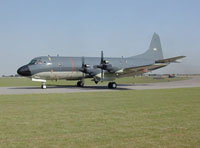|

|
|

|
The P-3
Orion, originally designated P3V, based on the Lockheed L-188 Electra,
which met limited success as a turboprop airliner competing against
emerging pure jets. It served as the replacement for the post-war era
P-2 Neptune.
The Orion
is powered by 4 turboprops which give it a speed comparable to fast
propeller powered fighters, or even slow turbofan jets such as the
A-10. Most other similar patrol aircraft use this model, with Soviets
adapting their own counterpart to the Electra.
The P-3 also competes with the British Nimrod adaptation of the Comet
and the French Breguet Atlantique. Experience with the P-3 helped with
the S-3 Viking carrier-borne ASW jet.
The P-3 has an internal bomb bay under the front fuselage, as well as
under wing stations which can carry missiles such as the AGM-84
Harpoon. It has a long 'stinger' in the tail which houses the magnetic
anomaly detector (MAD), and convex windows for observation. Sonobuoys
can be dropped from externally loaded tubes (P-3C and later) or from
inside the fuselage (A/B variants).
The first production version, designated P3V-1, first flew 15 April
1961, but by the time the first deliveries were made in 1962, the
unified designation system made this the P-3. Paint schemes have
changed from overall post-war blue, to 1960s white and grey, and 1980s
low visibility grey.
Over the years many variants have been developed. The technology of
the P-3 is similar to the larger, slower, and more successful C-130
Hercules transport. Similar versions have been developed for hurricane
hunting, and aerial surveillance with a rotodome adapted from the E-2
Hawkeye. Despite higher performance, the P-3 has not been adapted into
gunship or ground attack precision attack platform, aerial refuelling
tanker, or attempted a carrier landing like the C-130.
|
P-3 ORION Specifications |
|
Type |
Anti-submarine warfare (ASW) patrol aircraft |
|
Manufacturer |
Lockheed |
|
Accommodation |
five flight crew and 6
electronic operators |
|
Armament |
Bombs 20,000lb (9,000kg), Missiles AGM-84
Harpoon, AGM-84E SLAM, the Standoff Land Attack Missile, AGM-65 Maverick,
Other MK-46 and MK-50 torpedoes, mines and depth charges |
|
Performance |
Max speed 466mph (745km/h) |
|
Wing Span |
99ft 8in (30.4m) |
|
Length |
116ft 10in (35.6m) |
|
Height |
33ft 8.5in (10.3m) |
|
Weight |
weight empty 61,500lb (27,900kg), Max take off
weight 139,760lb (63,400kg) |
|
Powerplant |
four Allison T56-A-14
turboprops, 4,600shp (3,700kW) each |
|
Variants |
A large number of variants each with sensor
fit dependant on individual countries requirement |
|